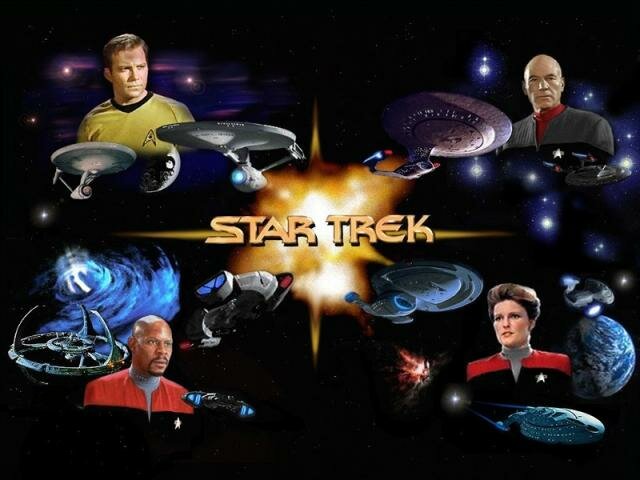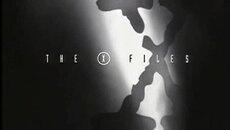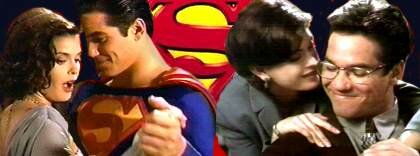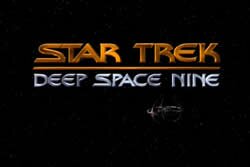You are hereMagazines 1990-1999 / Television Shows / Sci-fi TV
Sci-fi TV

ASTOUNDING TALES
By TOM SOTER
from DIVERSION, 1996
An intrepid, multi-racial crew goes where no one has gone before, exploring the deepest reaches of space. A scientist creates life but gets more than he bargained for when his creations turn against him. A pair of detectives investigate murders of psychics, using a psychic to help them. Earthlings battle aliens in space, where no one can hear you scream.
If it all sounds new and different, yet somehow vaguely familiar, welcome to age of Science-Fiction and Fantasy television. It’s 1996, and the weird and unusual has invaded the tube: a new “Outer Limits” is back; the weirdly compelling “X-Files” is entering its third season, graduating from cult to mainstream favorite; and the latest spinoffs of “Star Trek,” “Deep Space Nine” and “Voyager,” are zooming through broadcast space. Those shows are not alone, either: the fantastic in television is growing more normal every day, with such series as “Babylon Five,” “SeaQuest,” “Nowhere Man,” “Deadly Games,” “Lois & Clark: The New Adventures of Superman,” and “Space: Above and Beyond.” There's even a Sci-Fi cable network, featuring such golden oldies as “Twilight Zone,” “The Prisoner,” and “The Time Tunnel” (not to mention news programs and old movies).
Why science fiction and fantasy? Why now? When the original “Star Trek” premiered 30 years ago, it was an industry axiom that the genre of the fantastic was low-rated kid stuff. In fact, early TV sci-fi featured Rod Brown of the Rocket Rangers in silly adventures, and such later entries as “Lost in Space” and “Voyage to the Bottom of the Sea” found its heroes battling giant carrots and gun-toting clowns.
“Star Trek” changed all that. Gene Roddenberry’s space opera was the first sci-fi series to feature regular characters facing adult dilemmas. The people were believable, the issues, thinly disguised parables about the times that were a’changing, from the war in Vietnam and race relations to state-sanctioned murder and sexism. “Star Trek,” like the earlier anthology series “Twilight Zone” and “Outer Limits,” used its sci-fi format to disguise controversial, thought-provoking morality plays. And in doing so, the series set the tone for many future programs by proving that fantastic television wasn’t just for kids.
The current television sci-fi and fantasy renaissance, which began with “Star Trek: The Next Generation” in 1987, has presented a range of different series but almost all have two points in common: hi-tech, computer-generated special effects and a mile-long streak of paranoia. The latter is not surprising, either, since part of science fiction’s appeal is the way it uses the future to examine the present.
“If you look at the second season of ‘The X-Files,’ each episode of that season was supposed to be an exploration of our current political predicament,” noted Glen Morgan, a former writer on “The X-Files,” in Cinescape magazine. “Now that the Cold War is allegedly gone, are we creating are own little green men to be afraid of? Are we trying to create villains because we need some level of anxiety?”
Science-fiction is on the upswing because sci-fi acts as a barometer of the public’s basic concerns. Like the original “Star Trek,” which was born in a period of social unrest, these new series are being created in a time of radical political change. Paranoia may be in the air, but so is some of the best, and most adult, science-fiction drama on television.
Even with the success of “Star Trek,” sci-fi and fantasy TV can’t escape the stigma of the “kid’s stuff label.” For every “X-Files” and “Nowhere Man,” there is a “Deadly Games” or “SeaQuest,” aimed at kids. Some more-or-less adult-oriented shows, still make concessions to the youth market, and some are for the adult-as-child. Here’s a quick critical and demographic rundown of some of the more interesting programs:
Adult Head Games
 THE X-FILES (Fox)
THE X-FILES (Fox)
Probably the creepiest, scariest, and yet most adult fantasy series on the air, “The X-Files,” a Golden Globe-winner as best drama, tackles weighty issues of trust and respect but also throws in enough subtle scares to shake the most hardened horror buff. The protagonists, special FBI agents Scully (Gillian Anderson) and Mulder (David Ducovny), are troubled seekers of truth, a pair who examine strange deaths and incidents that usually do not have a rational explanation (UFOs, the paranormal, psychic murderers, killers who use lightening bolts). A somber series in which the duo can’t even trust their own bosses to tell them the truth (“Trust No.1” is the password on Mulder’s computer), “X-Files” is made palatable by its low-key, realistic approach and no-nonsense heroes. The program mixes mysticism and the unexplained with grisly deaths and gunplay, fashioning its stories out of a public fascination with the unusual and inexplicable. A recent three-part episode took paranoia to new heights, implying U.S. government complicity in the mass extermination of Jews, genetic engineering, and murder. Some may find it Oliver Stone-ism runamuck, but is it any wonder that the series has struck a chord? With the widespread suspicion of government and government conspiracies, who wouldn’t believe? There may be things we can’t explain, but the popularity of “The X-Files” isn’t one of them.
LOIS & CLARK: THE NEW ADVENTURES OF SUPERMAN (ABC)
This version of the 58-year-old super-hero mixes the romantic, slightly camp elements of “Moonlighting” with the action-adventure formula of the old “Superman” series, attempting to give the goings-on a young adult spin. Here, Superman is a 20-something reporter with an on-again, off-again romance with Lois Lane. The emphasis is on their relationship (hence the cutesy title), with adventures and super-villains taking a back seat. Clark and Lois are looking for love and companionship but find that super-powers bring only complication (when Clark proposes to Lois, she’s ticked off at him for lying to her about his secret identity). The two bicker a lot (“Is my being in danger old hat for you?” she complains when he is almost too late in rescuing her) as the program tries to handle the characters and issues realistically and wittily. Lacking the depth and sophistication of “X-Files” or even “Star Trek,” “Lois & Clark” is enjoyable as a free-wheeling romp, part-soap opera, part-action/adventure. Be warned, however: If you’re nostalgic for George Reeves’ straight-fisted heroics, this Superman isn’t for you. But if you want to smile at an interesting take on an old idea, check it out. Your kids will certainly enjoy the silly villains.
STAR TREK: DEEP SPACE NINE (Syndicated)
The third “Star Trek” series is the least interesting one, although you have to give the producers credit for trying something different. Unlike its predecessors, Deep Space is not set aboard a traveling spaceship seeking out new worlds; it all takes place on a space station near a wormhole (a spatial anomaly that transports spaceships millions of miles in a second). If “Star Trek” was “Wagon Train” to the stars, “Deep Space” is “Gunsmoke,” right down to the saloon keeper, friendly doctor, and weird-looking visitors who drop in to cause mischief. The series has tried for personal, character-driven stories, but so far has failed to light the public’s fire. As a result, the fourth season has added Worf (Michael Dorn), the dour Klingon from “Next Generation,” and, if the season opener is any judge, upped the action quota. It’s my least favorite “Star Trek,” partly owing to the relatively dull characters, led off by somber Avery Brooks as Captain Benjamin Sisko. The only bit of life comes from the ill-tempered security guard, an alien shape-shifter named Odo (Rene Auberjonois), who is haunted by his past as he tries to fit into a world he never made. Children may enjoy the cute aliens who drop by for a mug of tranya.
Space Wars, Diverting Kid Stuff
SPACE: ABOVE AND BEYOND (Fox)
Some whiz-bang producers must have been looking at the most popular action flicks of the last few years when they put together this series. A combination of Top Gun and Aliens, with a little Star Wars thrown in, “Space: Above and Beyond” chronicles the adventures of a group of marine cadets in the year 2063 as they engage in space combat with a nasty, unseen alien force that destroyed an unsuspecting earth colony. The stories, a far cry from the shiny world of “Star Trek,” are somber, dimly lit tales of prejudice, fear, and violence, set in a militaristic earth of the future. “Space” uses its sci-fi trappings to touch on contemporary issues like affirmative action and feminism but also doesn’t forget what a war series is about: each episode has at least one flashy space dogfight. The characters, however, are stereotypes, designed to appeal to the teen market, and the series is most interesting when it delves into the gritty side of war. It’s a far cry from the sophistication of the old “Combat!” series, though, which used its war stories to explore human dilemmas. Now that was a great show.
BABYLON FIVE (Syndicated)
Babylon 5, a five-mile-long, United Nations-style space station in the year 2259, is the center of intrigue, aliens, and plenty of action as Captain John Sheridan (Bruce Boxleitner) tries to keep the peace and uncover the roots of a conspiracy against the United Earth government.There are a lot of space battles, the usual multi-racial, multi-gender, and (for sci-fi) multi-species cast, but “Babylon Five” offers nothing particularly new or different, except for how many ideas have been recycled from past movies and series, including Bladerunner, Star Trek, Battlestar Galactica, and Star Wars. Although the show presents a dark take on the future, Boxleitner’s hero is a true-blue action hero, ready to leap into action. Billy Mumy, Will Robinson from “Lost in Space,” co-stars as an alien. Warning! Warning! as the Robot used to say. Adults need not apply.

